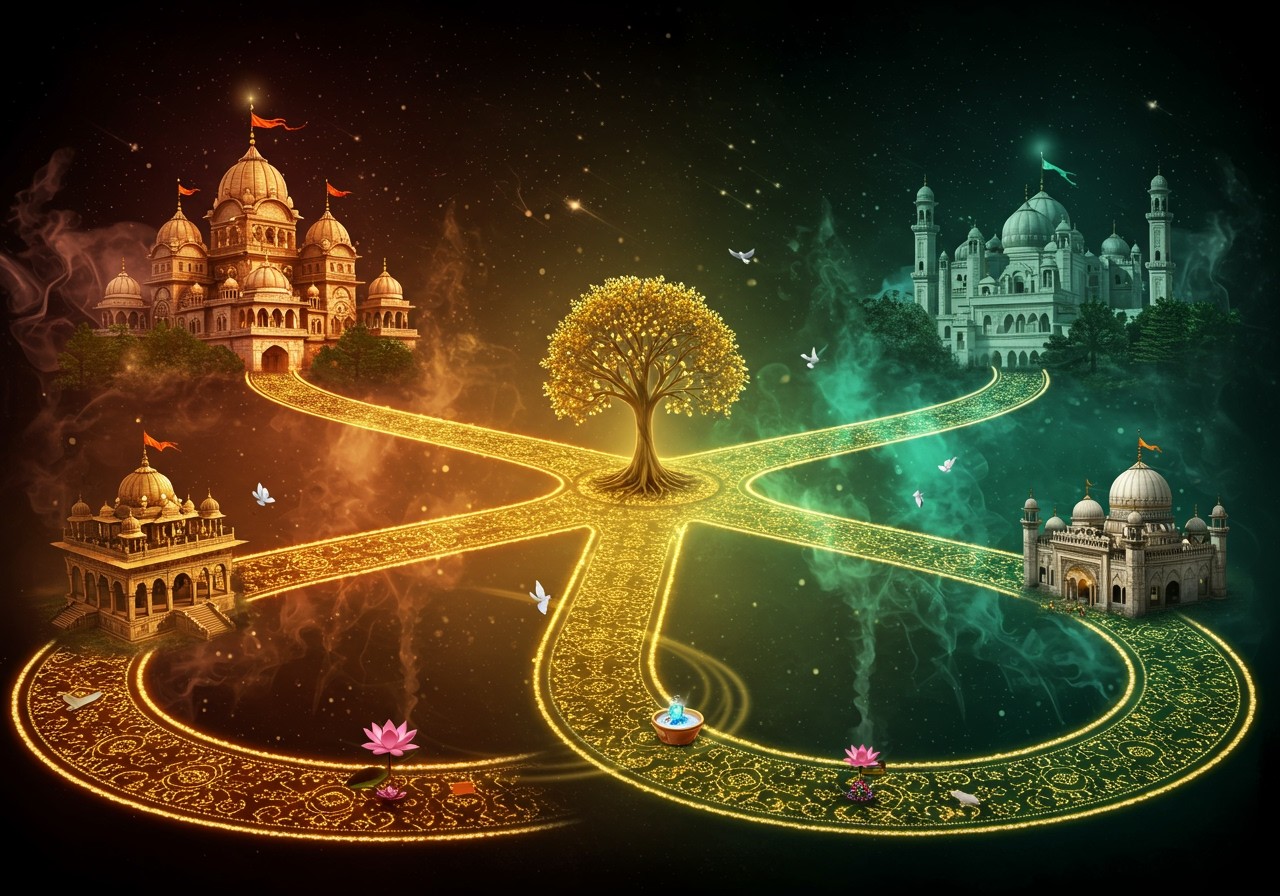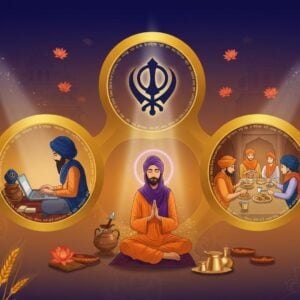Exploring the Shared Spiritual Tapestry of India: Hinduism, Sikhism, and Islam

India’s vibrant history offers a rich tapestry of spiritual traditions. Hinduism, Sikhism, and Islam have shared and shaped the cultural and spiritual landscape over centuries. The Mughal Empire played a pivotal role in this interaction. During their reign, cultural exchanges enriched religious practices. Imagine the vibrant bazaars and courts where ideas flowed freely, fostering a cross-pollination of beliefs and customs.
The Bhakti movement stands out as a significant period. It emphasized devotion and love for the divine, bridging gaps between Hindu and Islamic spiritual beliefs. Saints like Kabir and Guru Nanak advocated for unity and equality, transcending religious barriers. Their teachings continue to inspire millions today, reminding us of the shared essence of spirituality.
Sufism, a mystical Islamic tradition, also fostered spiritual dialogue. Sufi saints like Khwaja Moinuddin Chishti engaged with Hindu communities, promoting love and compassion. This dialogue fostered mutual respect and understanding, shaping spiritual practices in both religions. It’s a testament to the power of interfaith dialogue in building bridges of understanding.
These interactions highlight the cultural fusion that has enriched religious practices in India. Each religion has retained its unique identity while embracing shared values. This cultural heritage underscores the importance of understanding and respecting diverse spiritual traditions in our multicultural world. It’s a celebration of India’s rich spiritual diversity.
One God, Many Paths: The Concept of Divine Unity
Monotheism, the belief in one God, is a cornerstone of these religions. In Islam, the concept of Tawhid emphasizes the absolute oneness of God (Allah). The Quran reinforces this belief, guiding Muslims in their faith journey. Sikhism shares a similar belief in Ik Onkar, meaning “One God.” This belief forms the foundation of Sikh teachings, as found in the Guru Granth Sahib. It’s a powerful affirmation of the singular divine source.
Hinduism presents a diverse theological landscape. However, certain schools of thought like Advaita Vedanta highlight a singular ultimate reality, Brahman. This school views all forms of the divine as manifestations of this singular essence. It’s a concept that emphasizes the underlying unity beneath the multiplicity of deities.
While each tradition conceptualizes the divine differently, they share an emphasis on an ultimate reality. This shared belief fosters spiritual exploration and connection with the divine. It’s a testament to the universality of the spiritual quest.
Shared Wisdom: Scriptural Parallels and Ethical Teachings
Sacred texts offer a wealth of wisdom across these religions. The Quran, Guru Granth Sahib, and Hindu scriptures like the Bhagavad Gita convey similar ethical teachings. They emphasize compassion, truthfulness, and charity as core values. These values form the bedrock of a righteous life, guiding individuals towards ethical conduct.
In Hinduism, the concept of Dharma reflects righteous living, resonating with principles in Sikhism and Islam. These teachings encourage individuals to lead lives of integrity and service to others. They inspire us to strive for a life of purpose and meaning, contributing positively to society.
Expressions of Devotion: Rituals and Practices
Rituals hold profound significance in these traditions. Daily prayers like Namaz in Islam, Nitnem in Sikhism, and Sandhya Vandana in Hinduism foster spiritual discipline. They offer moments of reflection and connection with the divine, providing solace and grounding in daily life.
Pilgrimage also holds special meaning. Muslims embark on Hajj to Mecca, while Sikhs visit Amritsar, home to the Golden Temple. Hindus revere Varanasi as a sacred site on the banks of the Ganges River. These journeys are often transformative experiences, deepening one’s faith and connection to the divine.
These practices reflect diverse expressions of devotion while sharing a common goal: spiritual elevation. They provide a framework for spiritual growth and offer a sense of belonging within a community of faith.
Community and Social Justice: A Shared Commitment
Community and social justice are central themes in these religions. Islam’s concept of Ummah emphasizes a global brotherhood, encouraging unity among believers. It promotes a sense of shared responsibility and mutual support within the Muslim community. Sikhism champions Sewa, or selfless service, urging followers to help others without expectation. It emphasizes the importance of giving back to society and uplifting those in need.
Hinduism’s Vasudhaiva Kutumbakam envisions the world as one family. This ideal promotes harmony and collective welfare. It encourages a sense of interconnectedness and responsibility towards all beings.
Historical figures embody these values. Guru Nanak advocated for equality and service, inspiring generations. Mahatma Gandhi championed non-violence and social justice, drawing from these spiritual teachings. Their lives serve as powerful examples of the transformative impact of faith in action.
These principles inspire initiatives that promote communal harmony and social welfare, reflecting the shared spiritual landscape of Hinduism, Sikhism, and Islam. They remind us of our shared humanity and the importance of working together for the betterment of society.
Poojn.in: Supporting Your Spiritual Journey
At Poojn.in, we understand the deep connections between Hinduism, Sikhism, and Islam, particularly through the shared reverence for the Divine. We offer authentic puja items that honour these shared spiritual values while respecting each faith’s unique practices. We believe in providing high-quality, genuine products that enhance your spiritual experience.
For Hindu devotees, we offer a wide selection of items, including:
- Pure brass and copper puja items: Crafted with meticulous detail, these items add a touch of traditional elegance to your worship space. Browse our collection of brass and copper items.
- Traditional conch shells (sankha) for sacred rituals: Used in various Hindu ceremonies, our conch shells are carefully selected for their quality and authenticity. Find the perfect shankha for your puja.
- Handcrafted lotus-shaped diyas: Illuminate your prayers with our beautifully crafted diyas, symbolizing purity and enlightenment. Explore our diya collection.
- Premium quality incense and dhoop: Create a sacred atmosphere with our fragrant incense and dhoop, enhancing your connection with the divine. Discover our range of incense and dhoop.
We also offer items suitable for various faiths:
- Prayer mats: Comfortable and respectfully designed for your daily prayers. Find the perfect prayer mat.
- Pure cotton worship clothes: Dress respectfully for your spiritual practices with our comfortable and pure cotton clothing.
- Meditation accessories: Enhance your meditation practice with our carefully curated selection of accessories.
- Sacred threads and mauli: Symbolic of blessings and protection, our sacred threads are crafted with reverence and care. Browse our selection of sacred threads.
Visit www.poojn.in to explore our complete range or connect with us at 03369029784 or WhatsApp us at 9476142738 for personalized assistance. Our team is dedicated to providing you with the best service and helping you find the perfect items for your spiritual needs. We offer convenient online shopping and doorstep delivery across India.
Embracing Our Shared Spiritual Heritage
The intertwined history of Hinduism, Sikhism, and Islam in India presents a beautiful tapestry of shared spiritual values and unique practices. These religions, each with its distinct path, remind us of the importance of embracing diversity while recognizing the underlying unity that connects us all. It’s a celebration of India’s rich spiritual heritage.
By understanding our shared heritage, we strengthen the bonds of unity and peace. Let us celebrate these connections and carry forward the spirit of mutual respect and harmony in our lives. In doing so, we honour a tradition that values both the richness of diversity and the unity of shared human experience. It’s a journey of understanding, respect, and celebration of our shared spiritual landscape.
Hinduism: A Celebration of Diversity and Tradition
Hindu Rituals: A Guide to Coping with Grief and Loss
Dharma and Karma in Hinduism Explained
Hinduism’s Global Reach: A Look at Its Diverse Traditions
Frequently Asked Questions
How are Hinduism, Islam, and Sikhism similar?
These religions share common values like compassion, honesty, and charity. They emphasize community, ethical living, and devotion to a higher power, fostering a sense of shared humanity and purpose.
What are some similarities between Hinduism and Sikhism?
Both Hinduism and Sikhism believe in karma and rebirth, emphasizing the importance of living a moral life. Meditation is a central practice in both traditions, promoting inner peace and spiritual growth. While Hinduism embraces a pantheon of deities, Sikhism focuses on the oneness of God.
What do Islam, Hinduism, and Sikhism have in common?
A core similarity is the belief in a supreme power, a divine source guiding the universe. Each religion has sacred texts that offer spiritual and ethical guidance, providing a framework for righteous living. Prayer and meditation are central practices, connecting individuals with the divine.
Do Hinduism, Islam, and Sikhism all have holy scriptures?
Yes, each religion has its own revered scriptures. Hinduism has the Vedas and Upanishads, Islam follows the Quran, and Sikhism has the Guru Granth Sahib. These texts offer profound wisdom and guidance for followers.
Is there a common ground in the festivals celebrated in Hinduism, Islam, and Sikhism?
Many festivals across these religions share common themes, such as the triumph of light over darkness and good over evil. Diwali in Hinduism, Eid in Islam, and Baisakhi in Sikhism all celebrate these universal themes, symbolizing hope, renewal, and the victory of righteousness. They also often involve community gatherings and celebrations, fostering a sense of togetherness.
How do these religions view the concept of God?
While each religion has its unique understanding of God, there are shared elements. Hinduism, with its vast pantheon of deities, ultimately recognizes a single supreme reality, Brahman. Islam is strictly monotheistic, with Allah as the one and only God. Sikhism also emphasizes the oneness of God, referred to as Waheguru.
Do Hinduism, Islam, and Sikhism practice similar rituals?
While each religion has its distinct rituals, there are some shared elements. Regular prayer is a common practice, providing a means of connecting with the divine. Community gatherings are also common, fostering a sense of belonging and shared faith. Acts of charity and service to others are emphasized in all three, promoting compassion and social responsibility.


